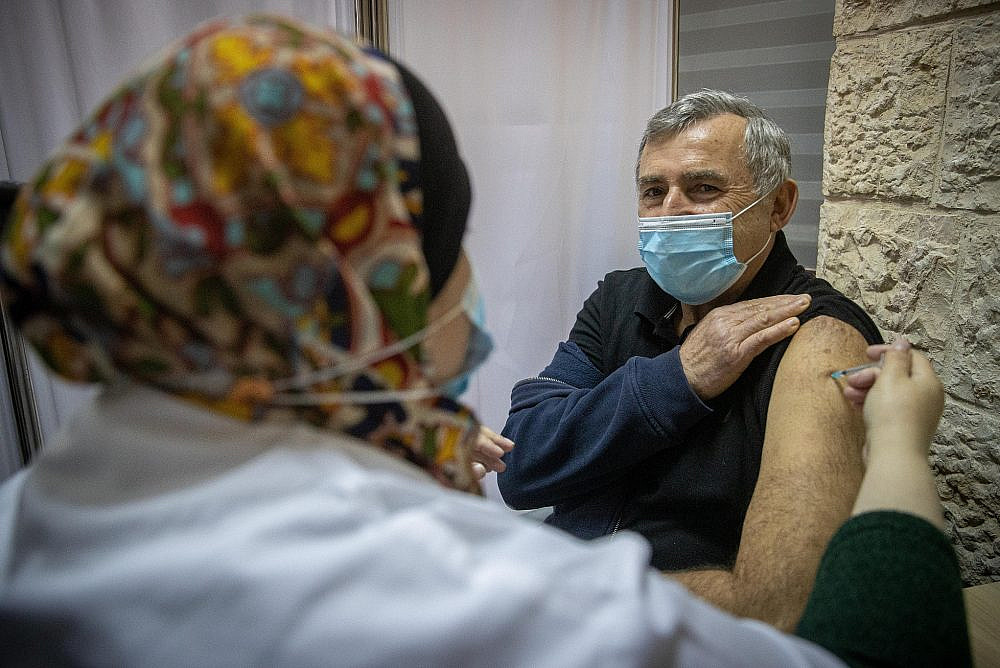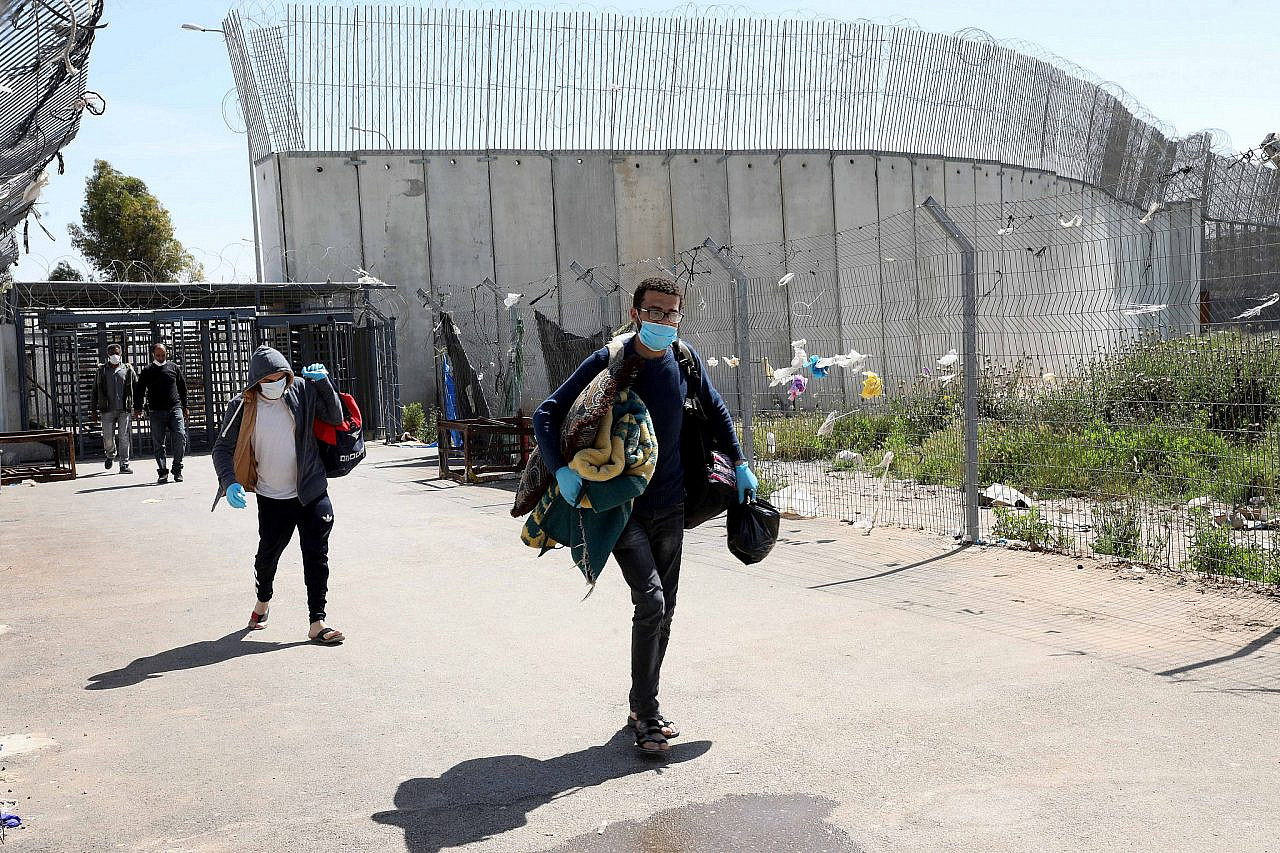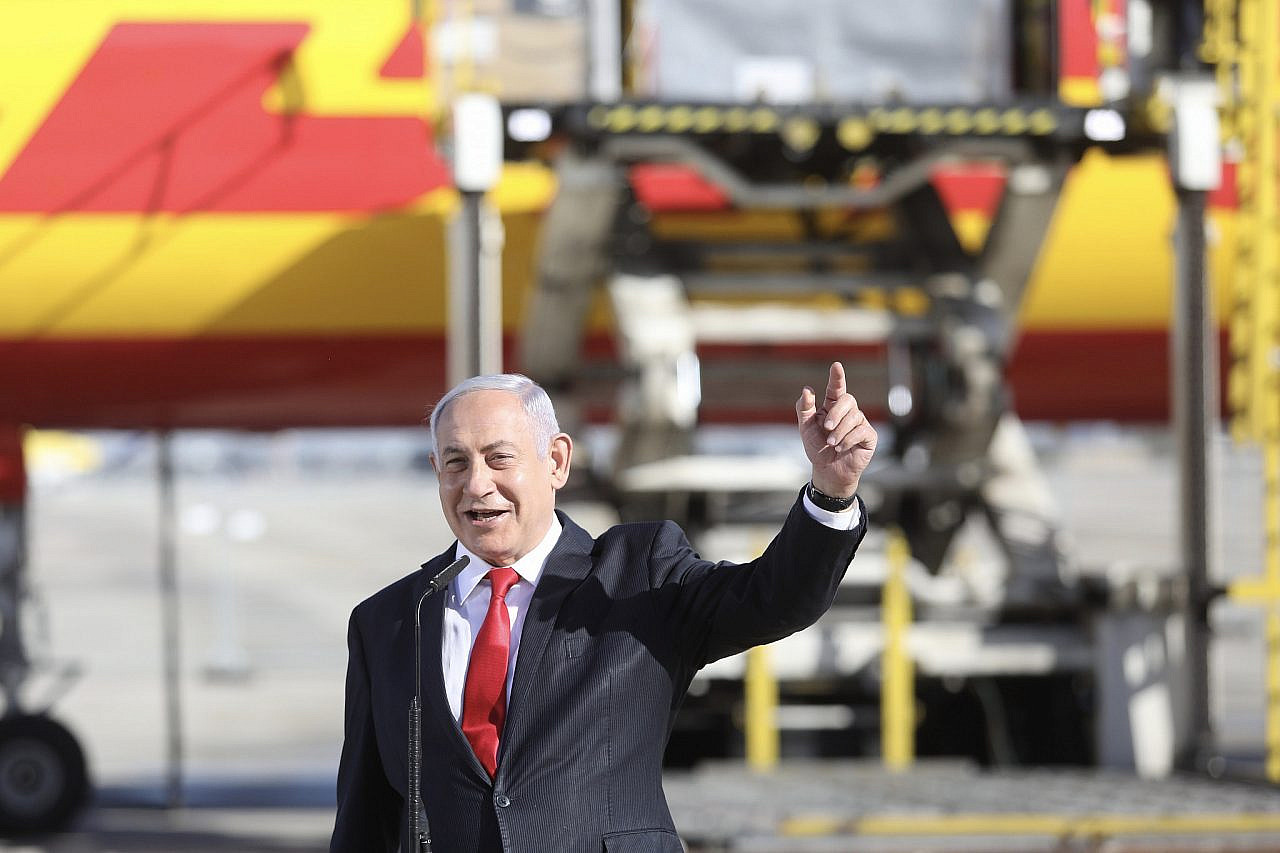Yes, Israel should be providing COVID vaccines for Palestinians
Israel was quick to receive international praise for its vaccination efforts, even though it is shirking responsibility for millions of Palestinians under its control.
 |
Members of Israel’s Foreign Ministry must have rubbed their eyes in disbelief this past week. One after another, foreign media outlets began publishing articles praising Israel for its national COVID-19 vaccination program. “Israel leads vaccine race,” declared both France24 and the BBC. Bloomberg ran an op-ed titled “Vaccination miracle brings Israel back to its roots.” The peak came with the New York Times, which compared the U.S. government’s disastrous response to the pandemic to that of Israel, under the headline: “How Israel Became a World Leader in Vaccinating Against Covid-19.”
From a distance, the emerging image of a functioning public health system being deployed across Israel and fulfilling its intended role certainly seems like something to be proud of. But upon closer examination, one begins to see the shortcomings, including a third full nationwide lockdown, and administering vaccines to hundreds of Prime Minister Benjamin Netanyahu’s office staff regardless of whether or not they are in at-risk groups or critical workers.
There is one big flaw, however, that cannot be covered up, even from a distance: Israel will not be inoculating the nearly 5 million Palestinians under its effective military control in the occupied territories, even as Israelis living in settlements are getting vaccinated.
According to Israel’s public broadcaster Kan, Israel covertly transferred dozens of doses of the COVID-19 vaccine to the Palestinian Authority this week, though the Palestinian Health Ministry has denied these reports. Instead, Palestinians are expecting to be vaccinated through COVAX, a global vaccine-sharing alliance. They are also hoping to receive some doses of the UK’s Oxford-AstraZeneca vaccine. When or how these campaigns will take place is still unclear, though.
Israel claims that, based on the 1990s Oslo Accords, the PA is responsible for administering health services to Palestinians, and is therefore in charge of procuring the vaccine. In fact, Israel is choosing to remain “on the fence” in everything having to do with inoculating Palestinians under occupation. This policy not only undermines Israel’s public health interests, it also goes against its obligations under international law to the Palestinian population it occupies.
 |
Firstly, from a practical standpoint. Areas B and C of the West Bank — the former is under Israeli military control and Palestinian civil control, the latter is fully under Israeli rule — are home to both Palestinians and Israeli settlers. Although Israel seeks to separate the two populations via walls, fences, and separate roads, it is impossible to truly segregate between Palestinians and Israeli Jews. Palestinian workers continue to work in the settlements and in Israel, while Palestinians and their family members can — with Israeli permission — go to hospitals in Israel or East Jerusalem. Meanwhile, both Palestinian citizens of Israel and a good number of Israeli Jews continue to visit the West Bank. The repercussions of not vaccinating the Palestinians will only prolong Israel’s battle with the pandemic.
Secondly, the 25 years that have passed since the Oslo Accords have not brought about the development of an independent Palestinian healthcare system. There is no independent Palestinian state, and Palestinians still do not have control over things like building permits, freedom of movement, imports and exports, and access to water.
All of a sudden, it has become convenient for Israeli officials to respect the wishes of the PA and refrain from imposing its vaccination program on the Palestinians. There is no greater hypocrisy than this, considering the immense asymmetry in power between Israel and the PA. The Palestinians do not want settler-only roads, nor do they want open-fire zones on agricultural land, nor to remain dependent on Israel for anything else. Israel, of course, does not rush to fulfill these Palestinian demands, but with the vaccines, Israel is ostensibly taking every precaution not to patronize the Palestinians and hurt their pride, their health system be damned. I am convinced that if Israel offers to provide Palestinians with doses of the vaccine in a respectful manner — without turning it into a public relations stunt — they would not refuse it.
 |
Lastly, due to its control of the occupied territories (I would love to hear a right-wing politician claim those territories do not belong to Israel), Israel has the legal, moral, and humanitarian responsibility for the vaccination of the Palestinian population. This obligation appears in various conventions, including the Fourth Geneva Convention and the International Covenant on Economic, Social, and Cultural Rights.
As an occupying power, the minimum Israel must do is fulfill this obligation, among the many it has accrued over five decades of its military occupation with distinctive apartheid features. The obligation to vaccinate becomes more urgent and unequivocal when pandemics are at hand, as the Fourth Geneva Convention plainly states. This responsibility does not disappear with the transfer of powers to the PA, since in reality the occupation has not ended, and Israel can decide if, how, and when the PA is able to ensure the health of the Palestinians living under its rule.
Even before Israel’s vaccination campaign began, Physicians for Human Rights Israel contacted Israel’s Healthy Ministry Director Prof. Hezy Levi and the Coordinator of Government Activities in the Territories Maj. Gen. Kamil Abu Rukun to warn that Israel must formulate criteria for allocating vaccines to Palestinians under occupation. Unfortunately, so far Israel has refrained from doing so, and this failure remains clear for all to see.


No comments:
Post a Comment
Note: only a member of this blog may post a comment.